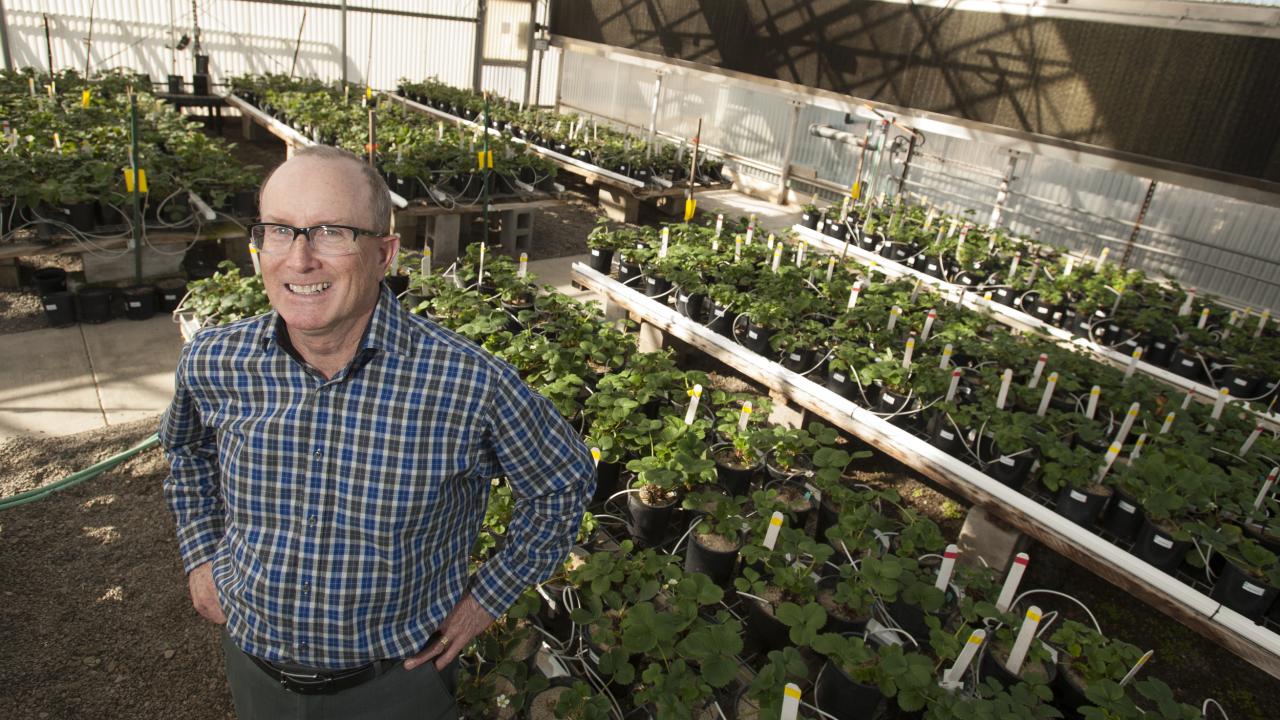The Public Strawberry Breeding Program at the University of California, Davis, and colleagues in California and Florida have received a $4.5 million grant from the National Institute of Food and Agriculture of the U.S. Department of Agriculture to improve the disease resistance and sustainable production of strawberries throughout the nation.
The collaborative grant is good news for strawberry farmers and consumers everywhere, according to Rick Tomlinson, president of the California Strawberry Commission. To signal its own support, the strawberry commission pledged an additional $1.8 million to the UC Davis program.
“An investment in the UC Davis strawberry breeding program is an investment in the future of strawberries,” Tomlinson said. “Thanks to their groundbreaking research and strong partnerships, Director Steve Knapp and his colleagues are developing improved strawberry varieties publicly available to farmers.”
Improving genetic resistance to disease
Strawberries constitute a $4.4 billion industry in the United States, and 94 percent of the nation’s strawberry fruit and nursery plants are grown in California and Florida.
Strawberries are especially vulnerable to soil-borne pathogens, which destroy plants and greatly reduce yield. Since the 1960s, strawberry growers have depended on fumigants like methyl bromide to treat soils before planting berries in an effort to control disease. But methyl bromide has been phased out by the Environmental Protection Agency and will no longer be available after 2017.
“Following the elimination of methyl bromide fumigation, strawberry growers are under greater economic pressures, and there is an urgent need for improved, disease-resistant strawberry varieties that will thrive without fumigation,” Knapp said.
Knapp will head a team of scientists from UC Davis, UC Santa Cruz, UC Riverside, the UC Division of Agriculture and Natural Resources, Cal Poly San Luis Obispo, and the University of Florida.
Together, researchers will identify and manage pathogen threats, mine elite and wild genetic resources to find natural sources of resistance to pathogens, and accelerate the development of public varieties resistant to a broad spectrum of disease and other pests.
“Strawberry growers are faced with the need to deliver high-quality fruit to consumers year-round, while protecting the environment, fostering economic growth in their communities and coping with profound changes in production practices,” Knapp said. “We look forward to collaborating with our industry partners through research, agricultural extension and education to help them reach those goals.”
UC Davis Public Strawberry Breeding Program
During six decades, the UC Davis Public Strawberry Breeding Program has developed more than 30 patented varieties, made strawberries a year-round crop in California and boosted strawberry yield from just 6 tons per acre in the 1950s to 30 tons per acre today.
Knapp took over directorship of the program in 2015. He and his team are working to develop short-day and day-neutral strawberry varieties; studying the genetics of disease-resistance, fruit quality and photoperiod response; and applying genomic techniques to make traditional strawberry breeding more efficient. They have 10 public varieties in the pipeline and plan to release one or two new strawberry varieties later this year.
Initiative collaborators
The grant is funded by USDA’s Specialty Crop Research Initiative. Collaborators from UC Davis include agricultural economist Rachael Goodhue, plant pathologist Thomas Gordon, and plant scientists Julia Harshman and Thomas Poorten.
Other key collaborators are Oleg Daugovish with UC Agricultural and Natural Resources; Alexander Putman at UC Riverside; Julie Guthman at UC Santa Cruz; Gerald Holmes and Kelly Ivors, both at Cal Poly; and Seonghee Lee, Natália Peres and Vance Whitaker, all of the University of Florida.
Media Resources
Steve Knapp, UC Davis Plant Sciences, 530-752-6884, sjknapp@ucdavis.edu
Diane Nelson, UC Davis College of Agricultural and Environmental Sciences, 530-752-1969, denelson@ucdavis.edu
Andy Fell, UC Davis News and Media Relations, 530-752-4533, ahfell@ucdavis.edu
